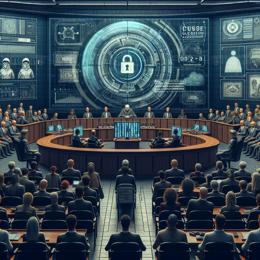Image created by AI
Nicaragua Accuses Germany at the World Court for Supporting Israel
The International Court of Justice (ICJ), also known as the World Court, has become the venue for a significant legal dispute with far-reaching geopolitical implications, as Nicaragua has initiated proceedings against Germany. This legal action is rooted in Nicaragua's assertion that Germany's actions, in providing financial and military aid to Israel and withdrawing funds from the United Nations Relief and Works Agency for Palestine Refugees (UNRWA), directly contravene established international laws.
At the heart of Nicaragua's claim is the argument that such German aid and policy moves are in violation of two seminal post-World War II legal instruments: the 1948 Genocide Convention, which is aimed at preventing and punishing acts of genocide, and the 1949 Geneva Conventions, which set out the laws of war, particularly in relation to occupied territories.
Drawing parallels to a recent case brought by South Africa, Nicaragua's submission to the ICJ builds upon the Court's previous acknowledgment that allegations raised against Israel regarding the potential violation of the genocide convention in Gaza could not be dismissed as implausible. In that case, the ICJ determined that preliminary measures needed to be implemented to ensure that further acts that could constitute genocide were halted.
Nicaragua's legal team suggests that under the Genocide Convention, not only are states obligated to refrain from committing genocide, they also have a binding duty to prevent and punish acts that could amount to genocide, including acts of complicity or attempts to carry out genocide. By extending military support to Israel, Nicaragua argues, Germany is failing in its international responsibilities under this Convention.
This development signals an increased willingness of nations to use international legal frameworks to challenge the actions of other states, particularly in complex geopolitical landscapes like the Middle East. The decision by Nicaragua to seek emergency measures from the ICJ is strategic, calling for an immediate cessation of military aid from Germany to Israel while the legal proceedings are underway. It underscores the urgency with which they view the potential implications of these actions.
Aside from the legal implications, the case presents broader considerations around the ethics and consequences of international arms trade, particularly in volatile regions. Germany's prominent role as one of the largest arms exporters to Israel, alongside the United States, shines a light on the political alliances and defense strategies that intertwine significantly with issues of human rights and international humanitarian law.
With Nicaragua's case filed, the ICJ generally incorporates a swift timeline for addressing requests for emergency measures, which typically involves setting a hearing date within a matter of weeks. This expeditious process is indicative of the gravity of the claims and the potential for immediate impact on the ground.
This unfolding situation at the ICJ will be watched closely by international observers, as the conduct of states in the global arms trade and their compliance with international law principles affecting human rights are scrutinized and questioned. The outcome of these proceedings may have deep and lasting ramifications on international relations, particularly those between states with vested interests in the Israel-Palestine conflict.










